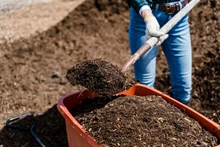
The mandatory blending of compressed biofuel with compressed natural gas (CNG) and piped natural gas (PNG) is set to revolutionize India's biofuel market, according to industry leaders.
The recent directive from the oil ministry mandates the blending of compressed biogas (CBG) in CNG and PNG, with a target of 1 percent blending by the financial year 2025-26.
Industry experts believe that this move will streamline the market for biofuels, making it more investor-friendly by reducing capital and operational costs. Gaurav Kedia, Chairman of the Indian Biogas Association, emphasized that selling biofuels in the market will become smoother, and the ecosystem will benefit from increased investor confidence.
The gas market, governed by the Ministry of Petroleum and Natural Gas (MoPNG), is expected to witness the reality of mandatory blending, further boosting the biofuel sector.
The government has outlined a phased approach, with the CBG blending obligation (CBO) being voluntary until the financial year 2024-25, followed by mandatory blending starting from the financial year 2025-26. The CBO targets are set at 1 percent, 3 percent, and 4 percent of total CNG/PNG consumption for FY26, FY27, and FY28, respectively.
From FY29 onwards, the CBO will increase to 5 percent. A Central Repository Body (CRB) will be responsible for monitoring and implementing the blending mandate.
Petroleum and Natural Gas Minister Hardeep Singh Puri highlighted that mandatory compressed biogas blending is expected to attract investments of approximately Rs 37,500 crore and facilitate the establishment of 750 CBG projects by 2028-29.
The government aims to stimulate demand for compressed biogas in the city gas distribution sector, promote import substitution for Liquefied Natural Gas (LNG), and save on foreign exchange.
However, challenges lie ahead, with one of the main hurdles being the availability of sufficient biogas to meet the mandated blending targets.
To address this, the government is actively promoting the production of ethanol from maize. Collaborative efforts with the Department of Agriculture and the Department of Food and Public Distribution (DFPD) aim to make maize a prominent feedstock in the coming years.
Gaurav Kedia acknowledged the current scarcity of biogas but expressed confidence in the achievability of the 1% blending target. He emphasized that the move would encourage the installation of CBG plants under the Sustainable Alternative Towards Affordable Transportation (SATAT) program.
Another challenge in mandatory blending is the evolving technology required to produce biogas from agricultural waste. Industry leaders believe that the entry of large players into the sector could expedite technological advancements.
Ashvin Patil, Founder and Director of Biofuels Junction, pointed out that significant investments in research and development (R&D) are being made by major players.
Additionally, international collaborations, such as the Global Biofuel Alliance (GBA) formed at the G20 Summit, are expected to facilitate technology transfer and accelerate progress in the sector.
The government has initiated collaborative efforts with the Department of Agriculture and DFPD to enhance high starch-yielding varieties of maize, improve the quality of maize DDGS (Dried Distillers Grain Solids), and expedite the registration of new seed varieties with high starch content.
To further promote maize, a training program for distillers in collaboration with seed companies has been initiated. The mandatory blending of compressed biofuel in CNG and PNG is seen as a game-changer for India's biofuel market. While challenges exist, the phased approach and collaborative efforts with various stakeholders are expected to drive the sector's growth. The government's focus on stimulating demand, import substitution, and forex savings underscores its commitment to fostering a sustainable and vibrant biofuel industry in the country.











